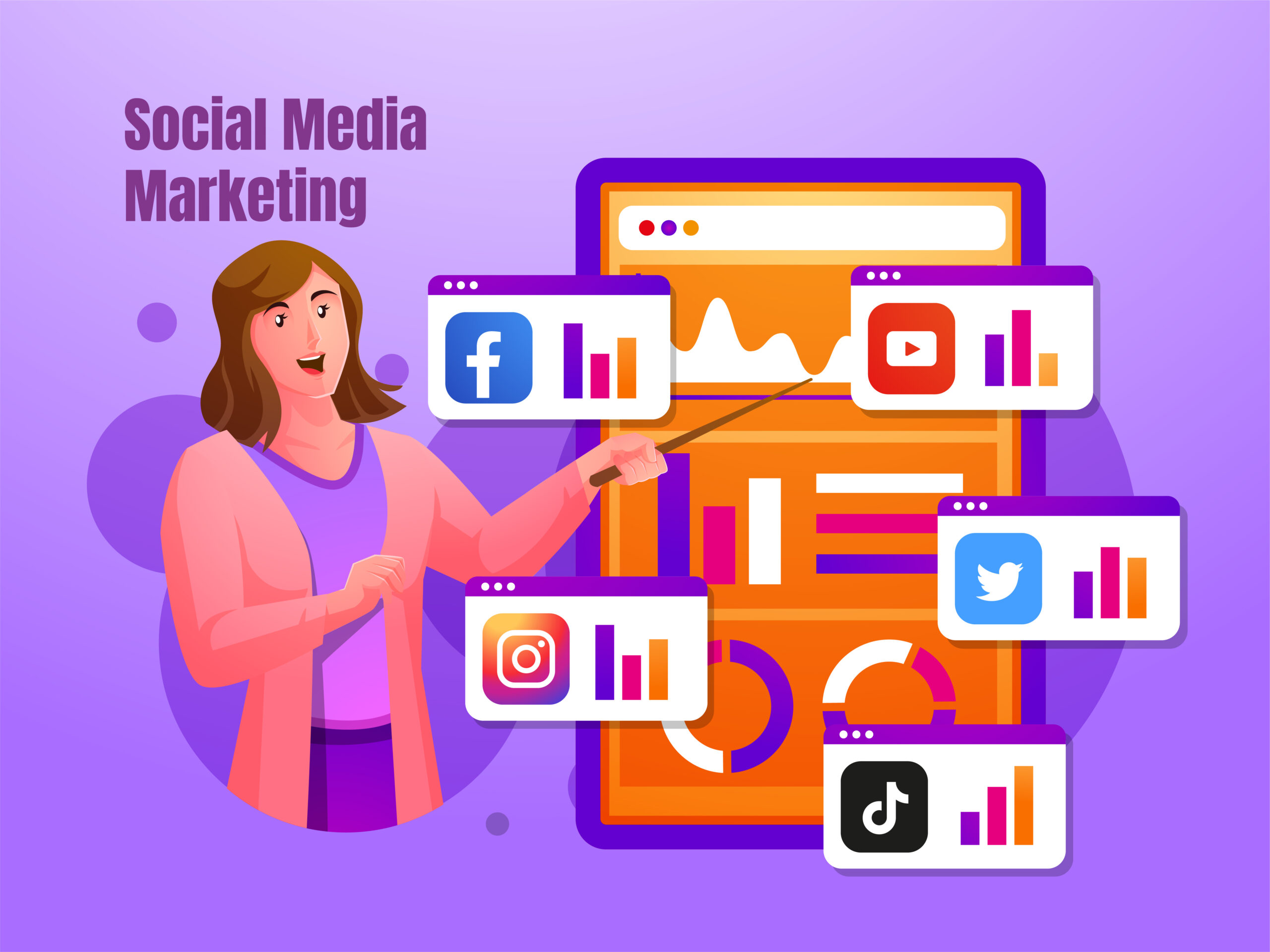Social media marketing has turned out to be an indispensable part of contemporary business techniques. With billions of users worldwide, platforms like Facebook, Instagram, Twitter, and LinkedIn offer unparalleled opportunities for businesses to reach their target audience and promote their products or services.
However, effective social media marketing requires careful planning and execution. In this article, we will discuss some proven strategies that can help businesses make the most of their social media marketing efforts.
Contents
- 1 Set Clear Goals:
- 2 Identify your target audience:
- 3 Choose the Right Platforms:
- 4 Create Compelling Content:
- 5 Utilize Visuals:
- 6 Message Consistency:
- 7 Have interaction with your target market:
- 8 Leverage Influencer Marketing:
- 9 Utilize Paid Advertising:
- 10 Track and Analyse Results:
- 11 Complete and optimize your profiles:
- 12 Optimize Content for Each Platform:
- 13 Utilize Hashtags:
- 14 Encourage Social Sharing:
- 15 Stay Updated and Experiment:
- 16 Frequently Asked Questions (FAQs)
Set Clear Goals:
Before diving into social media marketing, it is crucial to establish clear and measurable goals. Whether it’s increasing brand awareness, driving website traffic, generating leads, or boosting sales, having well-defined objectives will guide your strategy and allow you to track your progress effectively.
Identify your target audience:
Understanding your target audience is essential for successful social media marketing. Conduct marketplace research to become aware of the demographics, pastimes, and choices of your ability clients. This information will help you tailor your content and messaging to resonate with your audience and drive engagement.
Choose the Right Platforms:
Not all social media platforms are suitable for every business. Determine which platforms your target audience uses most frequently and focus your efforts there. For instance, if you are targeting professionals, LinkedIn might be more effective than Instagram. By concentrating your resources on the platforms that matter most to your audience, you can maximize your reach and engagement.
Create Compelling Content:
Content is the cornerstone of social media marketing. Expand a content material method that aligns with your emblem identity and resonates with your target market. Create a mix of different content types, including images, videos, infographics, blog posts, and user-generated content. Ensure that your content is valuable, informative, entertaining, and shareable to encourage engagement and viral sharing.
Utilize Visuals:
Visual content tends to perform exceptionally well on social media platforms. Incorporate high-quality images, videos, and graphics into your social media posts to grab attention and convey your message effectively. Use professional photography, eye-catching designs, and engaging videos to captivate your audience and increase their likelihood of sharing your content.
Message Consistency:
Consistency is key when it comes to social media marketing. Establish a consistent brand voice, visual style, and posting schedule across all your social media platforms. Consistency helps build brand recognition, establishes trust with your audience, and encourages them to engage with your content regularly.
Have interaction with your target market:
Social media is a – two-way conversation channel. Encourage your audience to interact with your content by posing questions, asking for feedback, and responding to comments and messages promptly. Engaging with your audience builds a sense of community and strengthens customer relationships, leading to increased brand loyalty and advocacy.
Leverage Influencer Marketing:
Influencer marketing can be a powerful tool to expand your reach and tap into new audiences. Perceive influencers in your niche who have a widespread following and align with your emblem values. Collaborate with influencers to create sponsored content or run giveaways to leverage their influence and reach a wider audience.
Utilize Paid Advertising:
While organic reach is valuable, paid advertising on social media platforms can provide an extra boost to your marketing efforts. Platforms like Facebook, Instagram, and LinkedIn offer robust targeting options to allow you to reach specific demographics, interests, and behaviors. Allocate a portion of your marketing budget to run targeted ads and monitor their performance to optimize your campaigns.
Track and Analyse Results:
Regularly track and analyze the performance of your social media marketing efforts. Utilize platform analytics and third-party tools to measure key metrics such as reach engagement, click-through rates, conversions, and return on investments (ROI). Use these insights to refine your strategy, identify what works best for your audience, and make data-driven decisions.
Complete and optimize your profiles:
Start by ensuring that your social media profiles are fully completed with accurate and up-to-date information. Use consistent branding elements such as profile pictures, cover photos, and descriptions across all platforms. Optimize your profiles by incorporating relevant keywords and hashtags to improve discoverability.
Optimize Content for Each Platform:
Each social media platform has its unique features and best practices. Tailor your content to fit the specific requirements of each platform. For example, on Instagram, focus on visual content with captivating images and concise captions. On LinkedIn, share industry insights thought leadership articles, and professional networking opportunities. Adapting your content to each platform will enhance its effectiveness and appeal to the respective audience.
Hashtags are powerful tools for increasing the visibility of your content and reaching a broader audience. Research and use relevant hashtags that are popular in your industry or niche. Incorporate both trending and niche-specific hashtags in your posts to increase the likelihood of being discovered by users who are interested in your content.
Encourage Social Sharing:
Make it easy for your audience to share your content by incorporating social sharing buttons on your website and blog. Include calls to action in your social media posts to encourage users to like, comment, share, and tag their friends. User-generated content, contests, and giveaways are also effective ways to encourage social sharing and increase brand exposure
Stay Updated and Experiment:
Social media platforms are constantly evolving, with new features and trends emerging regularly. Stay updated with the latest developments and experiment with new features and strategies.
Frequently Asked Questions (FAQs)
1. Is paid advertising necessary for SMM?
While organic efforts are important, paid advertising can boost your reach and target specific audiences. It’s often a valuable part of an SMM strategy.
2. What are the common mistakes to avoid in SMM?
Avoid overposting, neglecting customer interactions, using irrelevant hashtags, and not monitoring your analytics. Also, be careful with automation, as it can come across as impersonal.
3. How can I stay updated with SMM best practices?
Stay informed by following industry blogs, attending webinars, and experimenting with new strategies. Social media trends can change rapidly, so ongoing learning is essential.
4. Why is SMM important for businesses?
SMM helps businesses build a strong online presence, connect with their target audience, drive traffic to their websites, and ultimately, increase conversions and sales.
If you are looking for the Best Social media Marketing Agency for your Business please contact Bliss Marcom.
Office Address in Noida.



